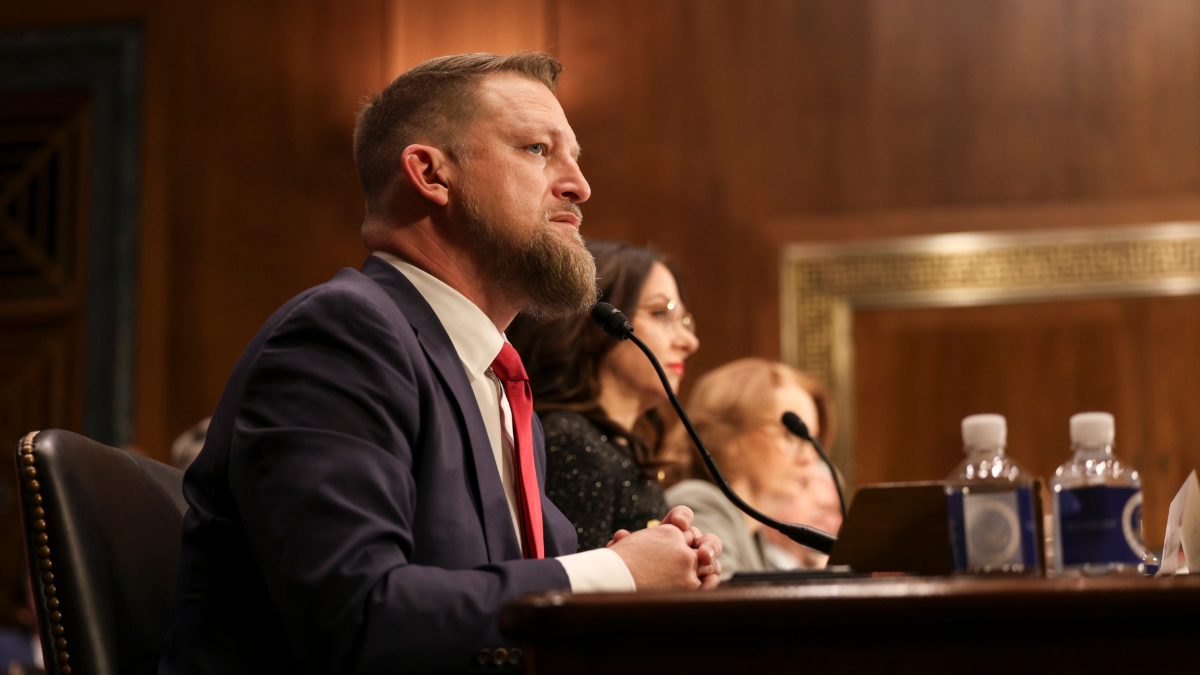Advocates Call for Federal Legislation at US Senate Judiciary Committee Hearing on Child Online Safety
Edward Simon Cruz, Jeremy Fredricks / Feb 20, 2025
Washington, DC—South Carolina House of Representatives member Brandon Guffey (R-48) wants Congress to pass federal legislation protecting against online sexual extortion. Guffey testified at a US Senate Judiciary Committee hearing on Feb. 19, 2025. (Joshua Sukoff/Medill News Service)
WASHINGTON — Brandon Guffey’s 17-year-old son Gavin died by suicide in 2022 after a sexual predator blackmailed him online. The father and Republican member of the South Carolina House of Representatives sprang into action over the next year and spearheaded the passage of Gavin’s Law, a statewide measure that criminalized blackmailing minors over sexually explicit photos or videos.
Guffey and four other people testified before the US Senate Judiciary Committee on Wednesday about the need for legislative action to protect children.
The experts and advocates said online abuse had continued to increase in recent years, while Congress failed repeatedly to pass any legislation. Witnesses called on Congress to pass laws that help families and law enforcement to protect children against online exploitation.
In the last term of Congress, numerous bills that would have strengthened protections for children online fell short of becoming law. The Kids Online Safety and Privacy Act (which combined two child safety bills, KOSA and COPPA 2.0) passed 91-3 in the Senate but died in the House. Another bill, the STOP CSAM Act of 2023, which would have made it easier to sue social media companies for not protecting kids online, failed to get a full vote in the Senate after it passed the Judiciary Committee.
“We have a US Senate that actually wants to create change,” John Pizzuro, CEO of the exploitation prevention organization RAVEN, told Medill News Service after the hearing. “We need to push the House in order to pass [legislation to protect children]. The bottom line is we’ve had hearings in the House, we’ve had great engagement, but at the end of the day we have to pass laws.”
Congress’s failure to act has consequences. The National Center for Missing and Exploited Children’s CyberTipline received “36.2 million reports of suspected child sexual exploitation” in 2023. Law enforcement can do little to stop this, especially if the material comes from IP addresses outside of the US. Less than 1% of cases involving child pornography have been investigated over the last three months, according to data from RAVEN.
It can be difficult to tell the difference between child pornography created by real people and generative AI, Pizzuro said. AI tools can manipulate people’s age and gender in images, making it easier to create sexually explicit content involving children. Now people can create pornography using AI.
Witnesses also discussed Section 230, a 1996 law that largely shields online platforms from legal liability for content posted by its users. The law has made it harder for families to hold tech companies accountable in court, several experts said.
On Tuesday, a federal appeals court affirmed a lower court’s dismissal of a case involving Grindr, a dating app for queer people. The lawsuit had sought to hold Grindr liable for defective design, among other allegations, as a result of the app matching adults and children for illegal sexual activity, but the court found that Section 230 barred all those claims.
“Section 230 was supposed to incentivize responsible content moderation. Instead, it did the opposite,” said Carrie Goldberg, a lawyer who argued that case and others seeking to hold tech companies liable for sexual and other physical harm to minors.
Committee members in both parties said they would continue pushing for legislation that protected kids. Sens. Dick Durbin (D-Ill.) and Josh Hawley (R-Mo.) announced Tuesday that they would reintroduce the Stop CSAM Act, and Democrats on the committee wrote on X that they would introduce another bill to “remove Big Tech’s legal immunity” later this week.
South Carolina state representative Guffey, who also testified before the committee in 2024, called on Congress to pass legislation to protect children like he did in South Carolina after his son’s tragic death.
“Big Tech is the Big Tobacco of this generation,” Rep. Guffey said at the hearing. “Politicians worry about their next elections, and leaders worry about the next generation.”
A transcript of the hearing is available here.
Authors

